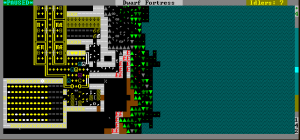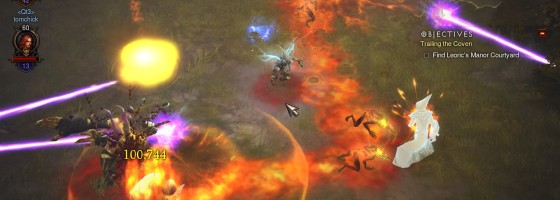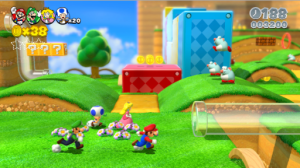Last week on the podcast I spoke with Chris Park from Arcen Games about open ended game design and he shared his thought process. And similar to my cast with Ernest Adams, we had a great discussion on game design that needs to be explored further for people interested in learning about design.
This time we’re going to talk about a useful way of creating a baseline for your game and establish a foundation to build on.
The Basic Game:
Talking about the steps it takes to make a game can be tough as everyone has their own opinions and philosophies on the matter. When I spoke with Jeff Vogel who creates RPGs, he said that he comes up with the stories first and then designs the game around them. But there are many cases of designers coming up with a cool mechanic or system and then figuring out how to build the game from there.
But when it’s time to start planning out your game, Chris talked about what he felt was the first thing you need to do: Figure out the core experience. In other words: What do you want someone to experience from the first minute of play?
It sounds like a simple question but nailing down your experience is a big deal as this is what’s going to define your game from start to finish. Many developers figure this out by developing a prototype and seeing how the game plays.
What’s important to understand is that a great game should be engaging from the very start, not after 10 hours of play or watching 3 hours of tutorials. There is a problem if your game at its basic fundamental level is not good.
” Not good” can mean many things: Maybe the controls are finicky, the gameplay is boring or confusing, the mechanics aren’t meshing right and so on.
The better the foundation of your game is, the easier it will be to expand upon it and make it amazing. But that doesn’t mean that a game with foundation problems is doomed from the start, as not every game can have a great foundation.
Niche Experiences:
The games that are the best mainstream hits are the ones with a great foundation and developers spend millions to figure that out. When I talked about Diablo 3 and compared it to Cookie Clicker, the base experience of Diablo 3 really is kill, loot and kill some more. From there, all the art, movies, systems and progression grow from that basic foundation.
But when a game isn’t engaging from the start and does have issues for the player to work around, that can still lead to great games, it just takes more work. Titles like the Total War series, Dwarf Fortress, X-Com, Paradox Software’s lineup and more are all considered great games, but their basic experience is not something that is easily engaging.

Dwarf Fortress is a labor of love but you need to look past the quirks of the system to be able to enjoy it.
You need to work at each of those games to learn their quirks before you can really begin to enjoy them, compared to titles like Diablo 3 or Mario Galaxy where the basic experience easily pulls you in.
However with that said, not every game can be engaging right out of the box as we talked about on the podcast. A game like Crusader Kings 2 is very hard to distill down due to the multiple interconnected systems. Much like Arcen’s latest hit The Last Federation where the game limits systems and unlocks them over time to try and make it easier to learn.
But that doesn’t work as you’re giving a player a false experience and not what the game is. If a tutorial doesn’t give the player an adequate explanation of what the game is about, then they won’t learn anything about how the game works. While it may be great to have every video game be as appealing as Diablo, Mario etc, if you’re approaching things from a level of complexity you sometimes have to bite the bullet and realize that not everyone is going to like or be able to figure out your game.
Building Up:
The key take away for this post for new game developers reading this is that the first step to making a great video game is figuring out what exactly you want your game to be about — Is it a platformer made up of challenging jumps? A first person shooter fighting ghosts? A strategy game of managing a company? And so on.
From there you need to establish at the very core of your experience what the player is going to be doing for the extent of their playtime. If that core is engaging without the need of art, music, graphics engine and other game systems, then you know that you have something great there. It’s why being able to prototype systems is such a useful skill as being able to see your mechanics beyond just visualizing them is vital to making a great game.
One of my first failed group projects was not learning this lesson. We spent so many months constantly changing the main gameplay after making some headway that the project just fell over on itself and nothing was accomplished.
Just like with kickstarter projects it’s never good to rush through development and planning. The better the foundation of your game is, the easier it will be to make an amazing game.



